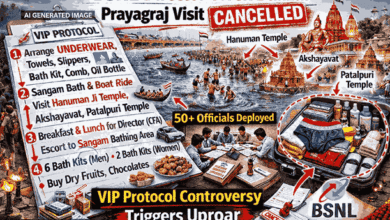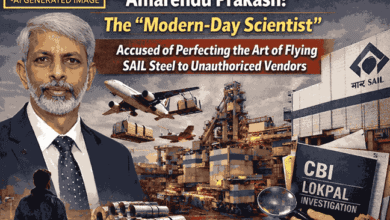SAIL In ₹800 Crore Scam: How Can The PSU Probe Whistleblower? Why Not An Independent Enquiry?
The Case of Rajeev Bhatia and the ₹800 Crore SAIL Steel Scam - "It's like handing over the keys of the locker to the thief himself."


This aptly describes the treatment meted out to Rajeev Bhatia, the whistleblower who exposed the ₹800 crore steel scam in Steel Authority of India Limited (SAIL). Instead of being protected or honored for his honesty and courage, he was harassed, suspended, and ultimately forced to resign.
Despite taking twice, the bold step of escalating the matter to the highest authority in the country – the Prime Minister’s Office (PMO) – the system failed him. The PMO forwarded the complaint to the Ministry of Steel, which, in a questionable move, routed it back to the very organization accused of the scam – SAIL.

The result? SAIL’s top management, against whom the complaint was made, simply dismissed the allegations and misled both the Ministry and the PMO. This move not only undermined the seriousness of the complaint but also compromised the integrity of the entire process.
It is worth noting:
- The Lokpal has indicted senior SAIL officials.
- The Central Bureau of Investigation (CBI) is currently probing the matter.
- Yet, no protection or justice has been extended to the whistleblower.
- The system has failed to give him even one fair hearing.
- Rajeev Bhatia even dared Chairman SAIL Amarendu Prakash for an open and public debate but Prakash failed to face him publicly.
How can an organization under investigation be allowed to handle the complaint against itself? The fundamental principle of justice—that no accused should investigate their own wrongdoing—has been completely disregarded.

A Systemic Failure
Whether it’s the corruption unearthed or the harassment and premature retirement Rajeev Bhatia faced, no central authority—including the PMO—has shown the will to act. This speaks volumes about the state of whistleblower protection in India, despite existing laws.
Is this justice?
Or has whistleblowing become a crime in our country?
Instead of safeguarding public interest and saving the exchequer from massive losses, Rajeev Bhatia has been punished.
This case must serve as a wake-up call. Independent, unbiased inquiries must be the norm in such high-stakes corruption cases. The credibility of institutions—and faith of honest officials—depends on it.

Here are the key issues that stand out:
- Forced Retirement of a Whistleblower: If Bhatia was sidelined or retired prematurely due to raising concerns, it points to victimization—a direct violation of whistleblower protection principles.
- Inaction Against the Accused: The fact that those under CBI investigation remain in office suggests either a failure of internal vigilance or deliberate shielding, which erodes employee morale and public trust.
- Misuse of Public Funds: The reported use of ₹67 lakh from SAIL’s treasury to defend those being probed, while denying similar support to the whistleblower, raises ethical and possibly legal red flags. Public Sector Undertakings (PSUs) are accountable for how they spend taxpayer money.
- Disparity in Legal Support: Hiring top-tier lawyers for accused officials while the whistleblower fights with personal funds underscores a structural imbalance that can discourage others from coming forward.

Despite numerous attempts in the near past, www.indianpsu.com has not received any response to its queries sent to Mr. Amarendu Prakash, Chairman of SAIL. The consistent silence raises questions about transparency and media engagement at the helm of one of India’s largest public sector undertakings. The reasons for this disengagement remain unclear—known perhaps only to Mr. Prakash himself, or, to quote humorously, the almighty.
If substantiated, this could be a case worth broader media coverage and public scrutiny. It also raises questions about the functioning of internal complaint redressal systems in PSUs and the role of oversight institutions like the Lokpal, CVC, and the Department of Public Enterprises.
Urgent Need for Reform in Handling Whistleblower Complaints
If this is the prevailing system, then what is the point of sending a complaint to the Office of the Prime Minister of India (PMO)? It increasingly appears to be a futile exercise, leading many to question the effectiveness and purpose of such a mechanism. We strongly believe that there is an urgent and pressing need to reform how complaints are handled and investigated, especially those concerning corruption and misuse of public funds.
- Our Prime Minister Narendra Modi has clearly articulated one of his top governance priorities: “Zero Tolerance Towards Corruption.”
In this light, when a whistleblower steps forward to safeguard public interest and prevents the loss of public money, such individuals should be protected, encouraged, and rewarded — not harassed or victimized by the very system they are trying to improve.
To uphold the integrity of the system and reinforce public trust, complaints of this nature must not be brushed aside or investigated in a perfunctory manner. If the existing mechanisms are inadequate or perceived as compromised, such complaints must be investigated by an independent, neutral committee, ideally headed by a retired Justice of the High Court or Supreme Court of India. This would ensure credibility, fairness, and transparency in the process.
We Report, You Decide…




